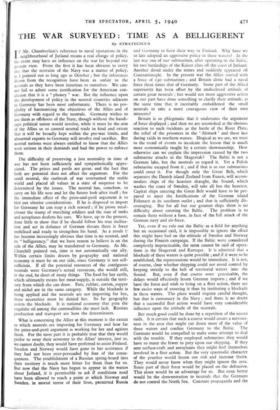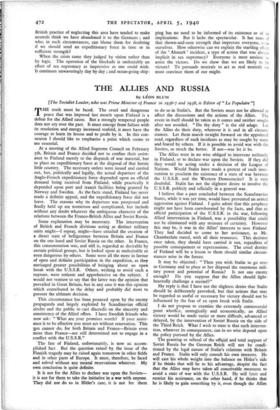THE WAR SURVEYED : TIME AS A BELLIGERENT
By STRATEGICUS
F Mr. Chamberlain's reference to naval operations in the I neighbourhood of Jutland means a real change of policy, the event may have an influence on the war far beyond our present view. From the first it has been obvious to every one that the restraint of the Navy was a matter of policy, as I pointed out as long ago as October ; but the inferences drawn from the recognition have been as unfair to the neutrals as they have been injurious to ourselves. We can- not fail to admit some justification for the American con- clusion that it is a " phoney " war. But the influence upon the development of policy in the neutral countries adjacent to Germany has been most unfortunate. There is no pos- sibility of harmonising the objectives of the Allies and of Germany with regard to the neutrals. .Germany wishes to use them as offshoots of the State, though without the handi- caps political union would involve, while it must be the aim of the Allies so to control neutral trade in kind and extent that it will be broadly kept within the pre-war limits, and abnormal exports to Germany will involve real sacrifice. But neutral nations were always entitled to know that the Allies were serious in their demands and had the power to enforce them.
The difficulty of preserving a just neutrality in time of war has not been sufficiently and sympathetically appre- ciated. The prizes and perils are great, and the fact that both are potential does not affect the argument. For the small neutral, the outbreak of war overturned the stable world and placed all values in a state of suspense to be determined by the issues. The neutral has, somehow, to carry on his life now and let the future look after itself ; for the immediate effect of the prize-and-peril argument is to blot out ulterior considerations. If he is disposed to import for Germany he can reap a rich reward ; if he prove recal- citrant the tramp of marching soldiers and the roar of tanks and aeroplanes deafens his ears. We have, up to the present, done little to show that if he should follow his true inclina- tion and act in defiance of German threats there is force mobilised and ready to strengthen his hand. As a result i:- has become increasingly obvious that time is no neutral, and its " belligerency," that we have reason to believe is on the side of the Allies, may be transferred to Germany. As Mr. Churchill pointed out, time is not automatically our ally. Within certain limits drawn by geography and national economy it must be on our side, since Germany is not self- sufficient. If all the potential resources of the contiguous neutrals were Germany's actual resources, she would still, in the end, be short of many things. The food for her cattle, which ultimately means her meat-supply, is outside the terri- tory from which she can draw. Fats, rubber, cotton, copper and nickel are in the same category. While the blockade is being applied and the neutrals are not importing for her, these necessities must be denied her. So far geography assists the blockade. It is national economy that puts the requisite oil among the commodities she must lack. Russian production and transport are here the determinants.
What is concerning the Allies at this moment is the extent to which neutrals are importing for Germany and how far the prize-and-peril argument is working for her and against them. For the most part it is probably true that they would prefer to sway their economy to the Allies' interest, just as, we cannot doubt, they would have preferred to assist Finland. Sweden and Norway would have gone to her assistance if they had not been over-persuaded by fear of the conse- quences. The establishment of a Russian spring-board into their territory is much more bitter for them than for us. But now that the Navy has begun to appear in the waters about Jutland, it is permissible to ask if conditions need have been allowed to reach a point at which Norway and Sweden, in mortal terror of their lives, permitted Russia and Germany to have their way in Finland. Why have we so late adopted an aggressive policy in these waters? In the last war one of our submarines, after operating in the Baltic.
hit two battleships of the Kaiser class off the coast of Jutland. Another dived under the mines and suddenly appeared off Constantinople. In the present war the Allies started with a force of 130 submarines ; and Britain alone had a naval force three times that of Germany. Some part of the Allied superiority has been offset by the undisclosed attitude of certain great neutrals ; but would not more aggressive action on our part have done something to clarify their attitude, at the same time that it inevitably emboldened the small neutrals to take a more courageous view of their own interests?
Britain is so phlegmatic that it underrates the argument of force displayed ; and then we are astonished at the obvious reaction to such incidents as the battle of the River Plate, the relief of the prisoners in the Altmark ' and these last daring raids in northern waters. Illogical as we are, we trust to the trend of events to inculcate the lesson that is much more economically taught by a certain showmanship. How otherwise can we explain the impression caused by the two submarine attacks in the Skagerrak? The Baltic is not a German lake, but the neutrals so regard it. Yet a Polish submarine escaped from it ; and if that is so our submarines could enter it. For though only the Great Belt, which separates the Danish island Zeeland from Funen, will accom- modate ships of the heaviest draught, the Sound, which washes the coast of Sweden, will take all but the heaviest. Capital ships entering the Great Belt would have to be pre- pared to meet the fortifications of the German island Fehmarn at its southern outlet ; and that is sufficiently dis- couraging. But for all but our greatest ships there is no difficulty about entering the Baltic. The problem is to remain there without a base, in face of the full attack of the German navy and air-force.
Yet, even if we rule out the Baltic as a field for anything but an occasional raid, it is impossible to ignore the effect this might have had on the attitude of Sweden and Norway during the Finnish campaign. If the Baltic were considered completely impracticable, the same cannot be said of opera- tions in the Skagerrak and Kattegat. It is admitted that a blockade of these waters is quite possible ; and if it were to be established, the repercussions would be immediate. It is not, of course, clear whether shipping could not avoid control by keeping strictly to the belt of territorial waters into the Sound. But, even if that course were practicable, the delays would effectively lessen German imports ; and if we have the force and wish to bring on a fleet action, there are few easier ways of ensuring it than by instituting a blockade in these waters. The plans would require careful thought, but that is customary in the Navy ; and there is no doubt that a successful fleet action would have very considerable influence upon the attitude of the neutrals.
But much good could be done by a repetition of the recent raids. It is certain that such a course would create a nervous- ness in the area that might cut down most of the value of these waters and confine Germany to the Baltic. The Germans would be compelled to make some attempt to deal with the trouble. If they employed submarines they would have so many the fewer to prey upon our shipping. If they sent surface-craft and aeroplanes they might find themselves involved in a fleet action. But the very spasmodic character of the practice would lessen our risk and increase theirs. They would never know when they might ignore the area. Some part of their force would be placed on the defensive. This alone would be an advantage for us. But even better would be the demonstration to neutrals that the Germans do not control the North Sea. Constant propaganda and the British practice of neglecting this area have tended to make neutrals think we have abandoned it to the Germans ; and who, in such circumstances, can blame them for doubting if we should send an expeditionary force in time or in sufficient strength?
When the crisis came they judged by vision rather than by logic. The operation of the blockade is undeniably an effect of sea supremacy as impressive as one could wish. It continues unwaveringly day by day ; and ocean-going ship- ping has no need to be informed of its existence or of its implications. But it lacks the spectacular. It has none of that shown-and-seen strength that impresses everyone, e ourselves. How otherwise can we explain the startling effect of the Altmark ' incident, a type of action that was al‘‘ implicit in sea supremacy? Everyone is most anxious to assist the victors. Do we show that we are likely to he victors? To persuade neutrals to act as real neutrals we must convince them of our might.















































 Previous page
Previous page